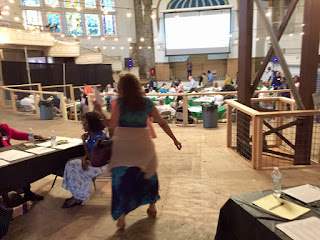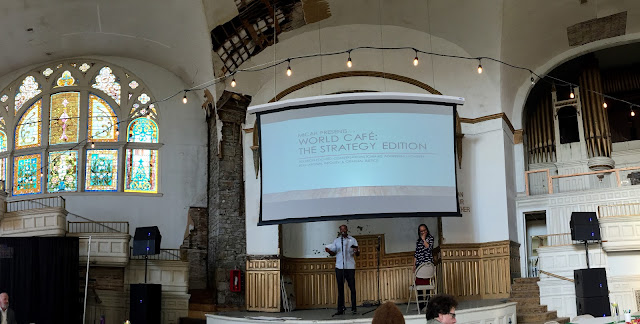MCIL adds accessibility to the community ideal
By Tim Wheat
The group MICAH is organizing to make Memphis a just and equitable community. They met last night at the Clayborne Temple downtown to work on the general areas of concern: Poverty, education and crime. MCIL was there to make sure that accessibility is part of the mission.
Emma Johnson explained the process for the evening's meeting. MICAH was holding a “world cafe” to capture conversations of diverse groups of Memphis residents. Each table of four to six had a host who remained seated at the tables while the participants moved around to mix-up the thought process. Most of the table hosts were members of MICAH’s executive committee.
The auditorium of the Clayborne Temple is still being renovated and a large section of the ceiling had no plaster. The original lathe boards were visible and one large exposed brick column was unfinished to the left of the stage. Tracy Spencer, the president of MICAH, told everyone that the iconic I AM A MAN posters that sanitation workers used in the 1968 campaign for equality were made in the Temple.
Emma Johnson explained how the world cafe works and gave participants suggestions and etiquette to guide in the discussions. She told about the concept of “listening to the middle,” as a way of seeing deeper connections and shared themes. Ms. Johnson also explained to participants some cafe etiquette to ensure listening, speaking from the heart and focusing on the topic. But overall, Emma Johnson asked participants to play and have fun.

The first question for the MICAH World Cafe was: What would a just Memphis look like? At various tables people generally spoke of housing, real desegregation and a sense of community. More directly, one participant said that a just Memphis would mean people walking everywhere; children playing with neighbors and people out of their homes engaged with others in the community. The vision included people using public transportation and being less dependent on cars and people with disabilities being fully and equally engaged in the public sphere.
Another question the world cafe dealt with was: What will it take for Memphis to become a just community? Ms. Emma Johnson asked participants to phrase the question like this:
“If Anderson Cooper were to come to Memphis to do a story on how the city became a just community,” she said. “What would you tell him was the important action that MICAH had taken to create a just city?”
One table gave the standard answers, education, housing and transportation. But the host challenged those responses as more of the same and would not result in a just community.
“What if,” the table host said, “Memphis organized 100 agencies with thousands of people to make a difference. Could one or two hundred thousand people make a change in this city?”
The challenge made participants in the world cafe think of real power. The standard options generally required money, but organizing for justice could guide how public money is spent. People can demand and guide solutions.



No comments:
Post a Comment